It is late in the summer of 2011 and there is a light drizzle in downtown Austin. Something must be wrong.
Twelve hours from now Fleet Foxes will perform onstage at Austin City Limits Live at The Moody Theater, more than 1,500 fans will sing along to "Mykonos" and a confetti canon will signal a faux New Years Eve. But for now the building is nothing but cold concrete and unkind metal made damp by the rain. What is it that transforms these raw materials into musical lore?
Could be the musicians. Johnny Cash, Stevie Ray Vaughan, Ray Charles, Arcade Fire, the list goes on and on. There is no shortage of cool when it comes to the longest running music show in the history of American television.
Could be the fans, those in Austin who have helped foster the city's culture as the live music capital of the world and those who tune in from around the world every Saturday night.
Yet more than likely the thing that makes Austin City Limits the benchmark for quality music television are the people who don't get any recognition: the producers, directors, interns, volunteers, and countless others who work behind the scenes.
After 37 seasons on the air, change is an easy storyline. But seeing as how the average tenure of an ACLTV employee is approximately 15 years, the more things change the more they stay the same.
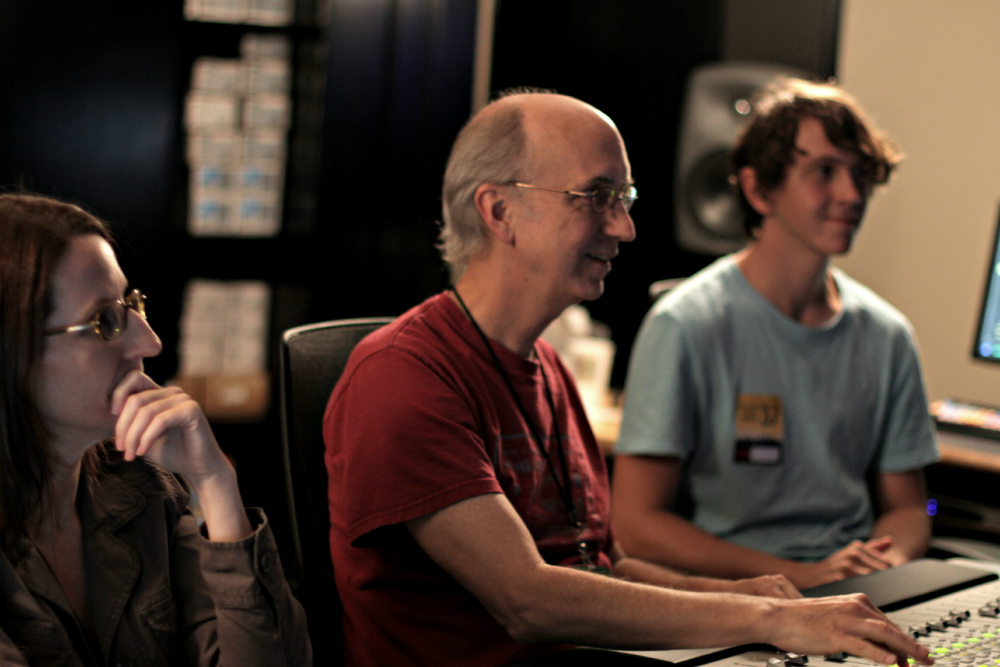 Sound engineer David Hough (center) has been with the organization since its first show 37 years ago. Photo by Ranjana Thomas.
Sound engineer David Hough (center) has been with the organization since its first show 37 years ago. Photo by Ranjana Thomas.
HOW IT BEGAN
Sound engineer David Hough has been with the show since its first episode in 1975. He came to Austin wanting to be a drummer and remembers "stumbling into some folks on Sixth Street who were kicking around the idea of filming a pilot for PBS." The ambitious group convinced Willie Nelson to be its inaugural performer and Hough worked the first taping, making sure the sound levels were good. Soon after the program aired PBS ordered 10 more episodes.
"I figured this would be great fun for a couple of years," Hough said. "But I never expected it to last." Famous last words. Sound engineer is practically the only job he's ever had. Nowadays Hough spends tapings in a sound booth behind the stage mixing and managing the audio. He recalls being at the press conference in Zilker Park when ACL Festival was announced in 2001, remembers when Merle Haggard was on the show and couldn't remember his own lyrics. Hough is an ACLTV lexicon but can't name his favorite show, claiming he doesn't have one because they were all so good. "All these years I've stayed in one place and everything around me has changed."
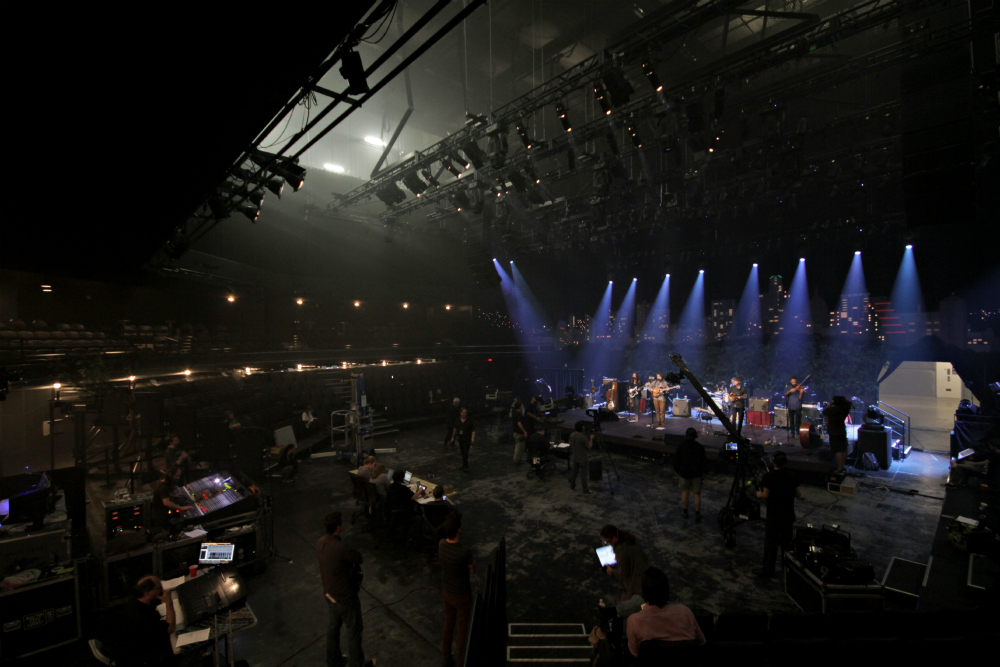 Inside Austin City Limits Live at The Movie Theater before it gets filled with hundreds of adoring fans. Photo by Ranjana Thomas.
Inside Austin City Limits Live at The Movie Theater before it gets filled with hundreds of adoring fans. Photo by Ranjana Thomas.
NEW DIGS
The biggest change, of course, is the new studio built alongside the W Hotel in downtown Austin. In February 2011 ACLTV staged its first taping in its new home to great kudos. Yet some fans can't stop pining for the old days in Studio 6A on the University of Texas campus, where the audience size was limited to 300 and the old wooden dance floor felt like it could give way if the crowd got too rowdy.
Freddy Fletcher, one of many responsible for the migration and the current partner in the ACL Live venue, doesn't miss the old days.
"I didn't want to be remembered as the guy who screwed up ACLTV," Fletcher said. "I watch the early episodes and I loved what they were doing but I hated the sound quality. The old studio is where it started and was really cool, but it wasn't set up for what the show turned out to be."
He refers to the new venue as a "big-ass recording studio" that was built from the ground up with ACLTV tapings in mind; right down to the 50-pound doors that keeps street noise on the street. State-of-art speakers, increased seating capacity, artist-accessible loading docks and sustainable building materials are newfound luxuries as well.
Yet Fletcher isn't just some hotshot developer. He's played backup guitar multiple times on the show, once for Guy Clark, and calls it one of the coolest things he's ever done, so he's mindful of the past. He spent six meticulous years overseeing the design and construction process, claiming his three priorities, in order, were sound quality, fan experience and being artist friendly.
"This is one of the highlights of my life," he says of the completed project. "It's the real deal. Nobody has anything like it."
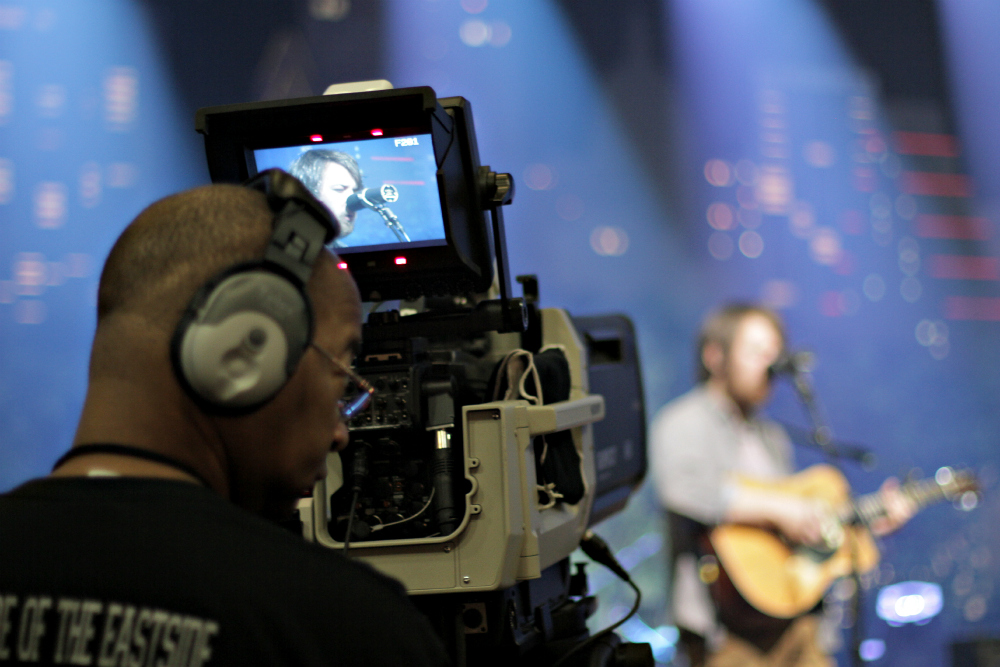 Robin Pecknold, lead singer of Fleet Foxes, was under the weather the day of the taping but fought through his illness to put on a heck of a show. Photo by Ranjana Thomas.
Robin Pecknold, lead singer of Fleet Foxes, was under the weather the day of the taping but fought through his illness to put on a heck of a show. Photo by Ranjana Thomas.
THE MUSIC
Terry Lickona joined the staff 32 years ago as a producer and has since worked his way up to executive producer, where he now resides as the proud paternal figure.
"You know our employees are passionate because they don't get paid as much as they could elsewhere, yet they stick around for a long time," he says. "Same for the musicians. We pay $600 no matter who they are, which is far less than most artists normally receive."
Lickona's role has evolved over the years, especially when it comes to booking the talent. He has helped pioneer the show's change from its roots in country western music to a modern mix of up-and-coming musicians.
"The basic concept hasn't changed, which is the reason why this show has survived. However, evolution is the key to our success. ACLTV was intended to be a showcase of Texas music, but after three years we'd burned through all our material. So we became a chronicle of popular music, with originality being the key word."
He is always looking to stretch the limits of the show. He's been trying to book Radiohead for years and hopes to someday book Paul McCartney, who Lickona claims has never performed in Austin. He also dreams of a techno show, the ultimate being Daft Punk, as he reveals with a sly smile that he has been in contact with the duo and that they are highly interested.
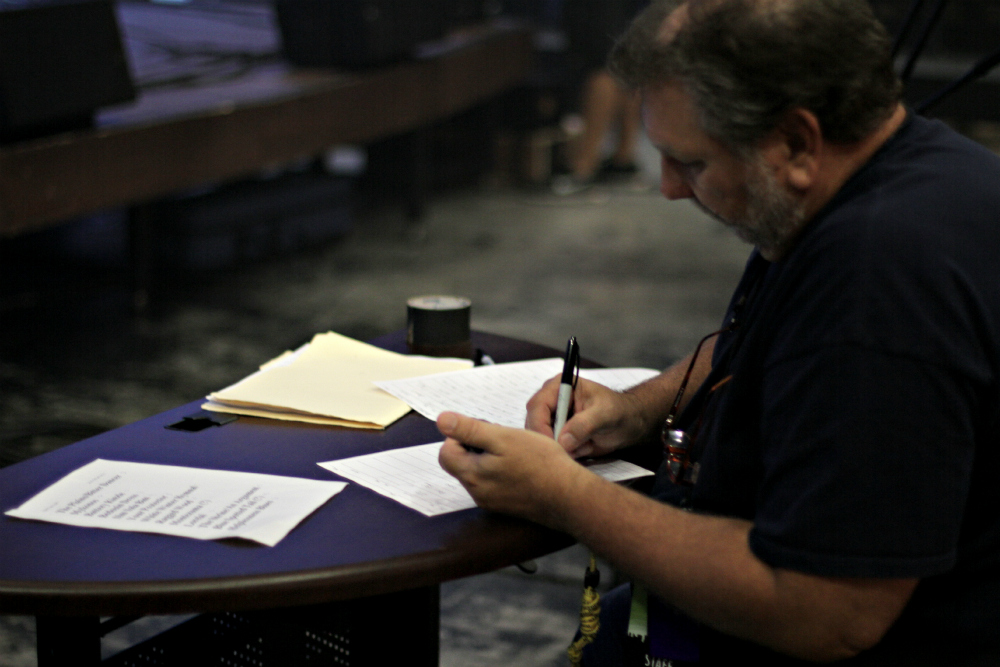 Director Gary Menotti watches camera rehearsal with his stop watch and takes notes on critical camera angles. Photo by Ranjana Thomas.
Director Gary Menotti watches camera rehearsal with his stop watch and takes notes on critical camera angles. Photo by Ranjana Thomas.
TEAMWORK
"First impression with the road crew is very important," says associate producer Leslie Nichols, who has been with the organization for 12 years. "If the crew is happy the whole day goes better."
Tapings begin at 9 a.m. with the equipment load in, and even though Nichols says you can't predict some of the things the band will do, today's load-in is not sexy. For hours it's a bunch of guys lugging around heavy equipment. Nichols handles contracts, hospitality arrangements and is a liaison throughout the day. "If I've done a good job preparing then I can sit around and laugh," she says as she checks her Twitter account for the 14th time that morning. She has clearly done her job because she's nice and relaxed.
The action doesn't begin until sound check, which is cancelled because Fleet Foxes lead singer Robin Pecknold isn't feeling well. In fact, he was so sick the band almost didn't make it to Austin for the taping. But with a steroid injection and multiple mugs of tea Pecknold takes the stage around 2 p.m. for camera rehearsal.
"Rehearsal is a negotiation," says Director Gary Menotti, who joined the staff as a PA during season two and became the director in season seven. "We really appreciate bands that know how beneficial it is to us, not just for them."
Menotti sits at a makeshift desk in front of the stage during rehearsal with a stopwatch taking notes on the camera angles he needs. These notes will later be given to the camera operators so they can position themselves for key shots, which in turn create a more intimate experience for the viewers at home.
If a band chooses not to rehearse -- which is rare -- Menotti says he is forced to rely on "drunks with a cell phone" who post live performances online. He then conducts the camera rehearsal with YouTube videos using the same stopwatch and making the same notes.
Energy bars are the meal of choice -- at any given moment a staff member can be spotted pulling back a wrapper and grabbing a quick bite. There is little time to waste as final adjustments are made to the lights and a magical 'do not cross' line is taped on the ground to allow live fans to get as close to the stage as possible without blocking the view for the fans at home. Typically this is when the band receives makeup, but the members of Fleet Foxes forgo the formality, which is fine since half of their face is covered by beard and long hair.
Volunteer ushers and ticket takers arrive around 5 p.m. for a brief orientation before fans are allowed into the venue an hour later. The volunteers wear their years of service as a badge of honor and are happy to give advice to first-timers on where to sit for the best sound or the best view.
Before Fleet Foxes can get started, Lickona addresses the crowd and politely requests cell phone cameras be kept in purses and pockets. He acknowledges, "cell phones are this generation's lighter," being held up in support of the artist but it doesn't make for good music television. Alas, as soon as Pecknold appears on stage the cell phones come out -- the fans just can't help themselves.
During the performance, photographer Scott Newton dons a backwards cap and prowls the venue like a leopard seeking the perfect camera angle. He's been shooting stills from ACLTV performances for 26 years, "attempting to capture the artists' spirit -- the invisible thing that motivates people that is both sacred and profane," he says. It's easy for him to list his favorite shows, namedropping Leonard Cohen, Wilco and Black Keys.
Newton gets so excited during tapings that the show's director had to scold him. "We'd be editing film and there's Scott bouncing around with the kids blocking the view," said Menotti. "So we had to ask him to calm down just a little."
Menotti is stationed in the control room with a battery of monitors displaying each camera's shot. Like a general he gives orders to his troops on the floor and the operators follow his command, but there is still time enough for him to joke about the amount of tea Pecknold has consumed throughout the show and how watching him is making Menotti have to use the restroom. Everyone laughs.
The process has evolved since the days of analog. Used to be once an edit was made it couldn't be changed, so it was imperative to get it right the first time. Now a few clicks of a mouse can change the entire set list. The artists themselves make all of the final song selections.
"A lot of good stuff might not even make it to the show," says Menotti. "Often times a band will forego its hit song, which feels strange but that's how we do it."
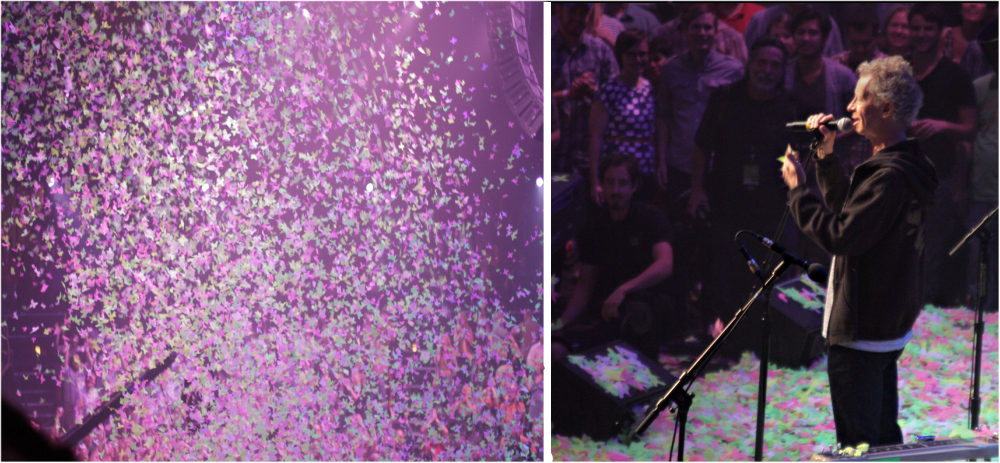 ACLTV Producer Terry Lickona addresses the crowd before celebrating New Year's Eve a bit early. Photo by Ranjana Thomas.
ACLTV Producer Terry Lickona addresses the crowd before celebrating New Year's Eve a bit early. Photo by Ranjana Thomas.
NEW YEARS
The night's taping is especially unique because Coldplay recorded a New Year's Eve show in September that was set to air December 31, 2011; only after the crowd counted down with Chris Martin the confetti canons didn't deliver much of a boom. KLRU was satisfied, as a non-profit organization it didn't have the money to pay for more confetti, but Coldplay didn't want to settle for less. So the band paid for bigger confetti canons and a certified "confetti guy" to come to Austin and re-create the countdown.
Pecknold joked via his Twitter account that Coldplay's confetti canons were better protected than his band's vintage guitars.
So once Fleet Foxes finished their set and received the standing ovation they left the stage, giving way to Lickona who starts the countdown from 10 to one, after which clouds of confetti are shot into the rafters and slowly fall from the sky. Couples kiss passionately like it is New Year's Eve despite it being roughly 9:30 p.m. on a random Friday in October. The confetti footage will then be spliced and added to the Coldplay episode.
"There's no better feeling than the end of the night," says Lickona. "When we have another amazing show in the can to add to the archives."
Check local listings and tune in this Saturday night, January 21, to watch the Fleet Foxes perform on ACLTV on your local PBS station.
This post has been modified since its original publication.